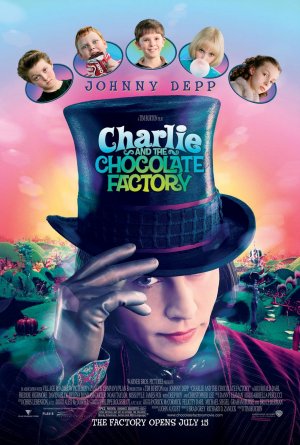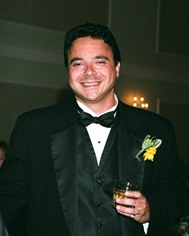 My reaction to Tim Burton’s “Charlie and the Chocolate Factory” is a lot like seeing an open box of chocolates, picking what you believe to be a caramel, and winding up with a butter cream – while it’s a good butter cream, it’s not what you expected and, ultimately, not what you wanted.
My reaction to Tim Burton’s “Charlie and the Chocolate Factory” is a lot like seeing an open box of chocolates, picking what you believe to be a caramel, and winding up with a butter cream – while it’s a good butter cream, it’s not what you expected and, ultimately, not what you wanted.
In the weeks before “Charlie’s” release, people asked if I would see the movie and, when I told them I would, there was a disappointed look on their faces, as though I had betrayed a planned boycott of the film from the collective fan base of 1971’s “Willy Wonka and the Chocolate Factory” who had grown up watching “Willy” on TV as I had.
In a recent interview, “Willy’s” star Gene Wilder noted the film’s initial lackluster theatrical release and credited television’s periodic airings of the film with turning “Willy” into the beloved family film it is today.
Yet, as much as I count myself among “Willy’s” legion of fans, I was hopeful upon hearing plans for a remake when I learned who had signed on as director. If anyone was going to put a new spin on this story and accentuate the dark nuances inherent in Roald Dahl’s 1964 book, it would certainly be Tim Burton, whose hallmark visual flair is ever evident in the films he has directed, such as “Beetlejuice,” “Batman,” and most recently, “Big Fish.”
For those unfamiliar with the story of “Charlie and the Chocolate Factory,” we are introduced to a boy named Charlie Bucket, who lives with parents and four bedridden grandparents in a small, one-room home. The Buckets have little money (as the bedridden grandparents can attest to by sleeping “head-to-toe” in one bed) and their meals consist of cabbage soup. Yet, despite their poverty, it is a home and Charlie uses the little money he earns delivering papers to provide for his family: Charlie is a conscientious, hard-working, caring boy.
In Charlie’s town, there’s a chocolate factory, built by Willy Wonka. At one time, the factory employed many of the people in town and produced candy that rivaled logic.
So imaginative were Wonka’s confectionary creations that they were magical (imagine designing ice cream that would remain solid even in intense heat).
Upon discovering that Wonka’s business rivals had employed spies in Wonka’s workforce to uncover his secrets, Wonka closed the factory and, years later, the factory suddenly and mysteriously began producing Wonka’s candy again, though no one was ever seen entering or leaving the confines of his factory.
One day, in a stunning announcement, the reclusive Wonka reveals that he is enclosing five golden tickets into five individual chocolate bars that will be distributed among the thousands of Wonka bars shipped worldwide.
The recipients of these five tickets will be invited to tour the factory, be given a lifetime supply of chocolate, and one of the five lucky recipients will receive an extra special prize. Suffice it to say, Charlie becomes one of the five ticket recipients.
Having not read Dahl’s “Charlie and the Chocolate Factory” but knowing he had written the screenplay for “Willy Wonka and the Chocolate Factory,” I can only imagine that, despite what happens to some of the children as they tour Wonka’s factory, there is a brighter tone than what Burton’s vision presents. While Dahl’s depictions of lessons learned in the repercussions of some of the children as they succumb to their willfulness and greed at different stages of the factory tour are left intact, Burton keeps it dark, both visually and with a creepy, distant recharacterization of Willy Wonka, played in “Charlie” by Johnny Depp (in his fourth collaboration with Burton).
Gone is the courteous-yet-crazed genius as portrayed by Wilder in 1971’s “Willy,” who led the children around the factory with an ominous calm despite – or in spite of – watching them tempted by the fantasy world of his creation. In “Charlie,” Depp’s Wonka is a pale, remote, man-child who acts largely as a spectator himself as he moves the group through his factory, recoiling from any child’s affection and speaking to them through pristinely white teeth in the sing-songy manner of TV’s Mister Rogers.
Gone also from “Charlie” is much of the music from 1971’s “Willy,” save for Wonka’s tribe of factory workers – the Oompa Loompas. They do sing at the end of each bad child’s fate, with new music from Danny Elfman, who continues to compose music for Burton’s films.
Though they don’t sing the traditional Oompa Loompa song fans of “Willy” are accustomed to and appear dressed in mono-colored latex uniforms akin to what the rock group Devo had worn during their career, the Oompa Loompas perform various entertaining musical numbers, particularly one with a psychedelic riff at the conclusion of Veruca Salt’s scene of comeuppance.
Other highlights in “Charlie,” in addition to Burton’s always-inspired visuals are good performances from Freddie Highmore (who co-starred with Depp as Peter in “Finding Neverland” and whom Depp recommended for the role of Charlie) and David Kelly (“Waking Ned Devine”) as Charlie’s Grandpa Joe.
There are even new scenes added by Burton to avoid simply making a remake of a movie that didn’t need to be redone.
He provides flashbacks of the rise and fall of Wonka’s factory years earlier, the history of the Oompa Loompa’s origin with Wonka’s discovery of them, and creates a backstory for Wonka, detailing Wonka’s childhood through flashbacks of his denial of sweets by Willy’s dentist father (Christopher Lee) and how that denial fueled Willy’s curiosity for and his desire to become the premier maker of those taboo treats.
Still, Burton’s vision is cold. Though visually well-made, the overall joy and meaning of Dahl’s story is stifled. With “Charlie’s” plot omission of Slugworth’s everlasting Gobstopper test (so memorable in “Willy”), even Wonka’s awarding of the extra special prize at the end of the film seems like an afterthought.
If these two films were like the chocolates created within them, I can see true die-hard Tim Burton fans rejoicing at the bitter darkness of “Charlie.” I simply prefer the lighter, sweeter goodness of “Willy.”
